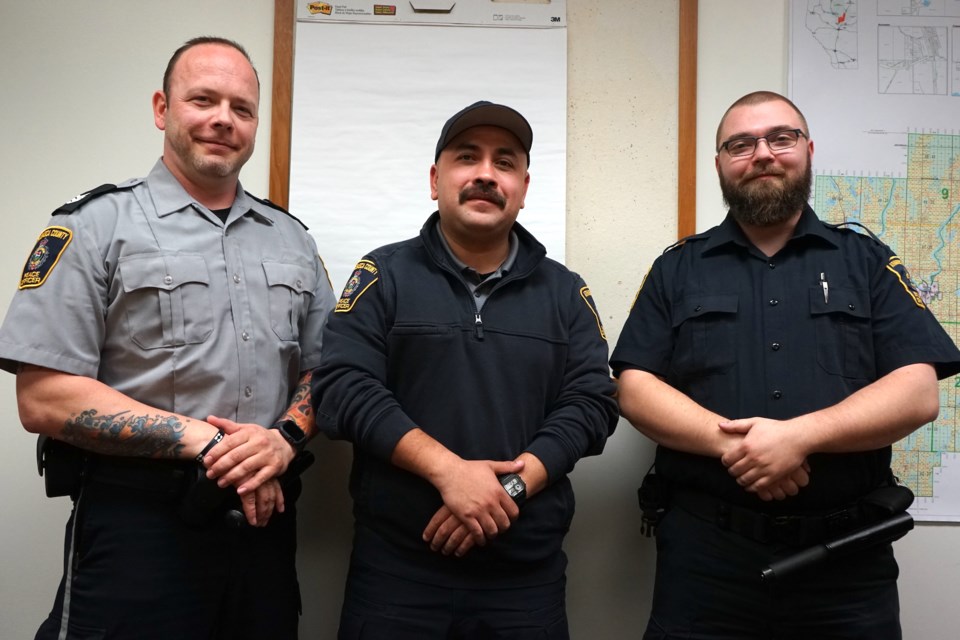ATHABASCA — Residents of Athabasca County may notice a new man in uniform patrolling the roads and attending community events after the Community Peace Officer (CPO) team welcomed an addition to the crew this spring.
Linden Ozirney joined Sgt. Jason Ollie and officer Ivan Alvarado as the newest face on the county’s CPO crew. He was officially appointed as a Bylaw Enforcement Officer by county councillors during their March 28 meeting — although he’s waiting on his Community Peace Officer appointment, Ozirney, Ollie, and Alvarado bring a combined total of 24 years of experience in law enforcement to the county.
“I’ve always wanted to be in law enforcement since I was a kid,” said Ozirney. I loved seeing the RCMP come through campsites, and Fish and Wildlife, and it was something I wanted to put my efforts towards.”
Ozirney said he’s eager to explore the county’s country and getting to know the community as he settles into the job, and is looking forward to the professional development his bylaw officer appointment will allow him.
Protective Services
Now with a full crew, Ollie said the team is in a better position to cover the more than 6,000 square kilometres that make up Athabasca County. While road and school zone patrols, bylaw adherence, and assisting other agencies in the area are among the crew’s duties, Ollie said improving public perception of their role is also on the priority list.
“Some people put a lot into titles,” said Ollie. “With law enforcement, titles do matter. Having it ‘enforcement,’ it just already attaches a bad stigma to it because, ‘enforcement,’ you’re automatically going to think tickets, punishment.
“That’s completely the opposite of what our department here is about,” he added. “We’re here to educate, get involved, not punish.”
While consequences for breaking bylaws or disregarding policies are necessary, Ollie said the prospect of a career in providing support, education, and mentorship is what drew him to the profession in the first place.
“I saw a lot of stuff growing up that a lot of people aren’t exposed to from my family’s business in hospitality,” said Ollie, who mentioned his own youthful encounters with officers who offered guidance rather than indifference.
“I had, fortunately enough, some good officers do that with me, so it’s kind of paying that forward,” said Ollie. “I find it very rewarding, and I feel that is part of the core values, to be a productive member of your community.”
Alvarado, who has been with the county as a peace officer for over six months, echoed Ozirney’s sentiment — seeing officers in action sparked an interest, even as he was wearing a different uniform.
“For myself, it started after I joined the fire department,” said Alvarado. “I started working close with the RCMP and the peace officers, and that’s what inspired me to join law enforcement.”
According to Ollie, one of the biggest problems within the county has been dog control. In January, a new draft bylaw for problem animals was presented to county councillors during a committee of the whole meeting which would give bylaw officers more tools for enforcement.
The bylaw will be considered for first reading during the council’s May 14 regular meeting — ahead of the potential new legislation, Ollie told another municipal council the team has made significant headway with the issue.
“The two biggest complaints that have been historical here would be dog complaints and unsightly properties,” Ollie told Village of Boyle councillors during their April 17 meeting. “There has been a 50 per cent drop in both.”
In 2022, the county tracked 35 official complaints about problem dogs, and in 2023, that number dropped to 17. Ollie credits the shift to the team’s increased visibility in his time here, an aspect he said will be a priority to continue moving forward.
“Us getting out there and speaking with neighbours, communities, addressing some of these concerns … we’ve seen a reduction,” said Ollie. “That’s ultimately what we want. We want to be able to get the community involved with our actions, and the community wants us involved in their actions.
“That’s that partnership, the basis of community policing.”



